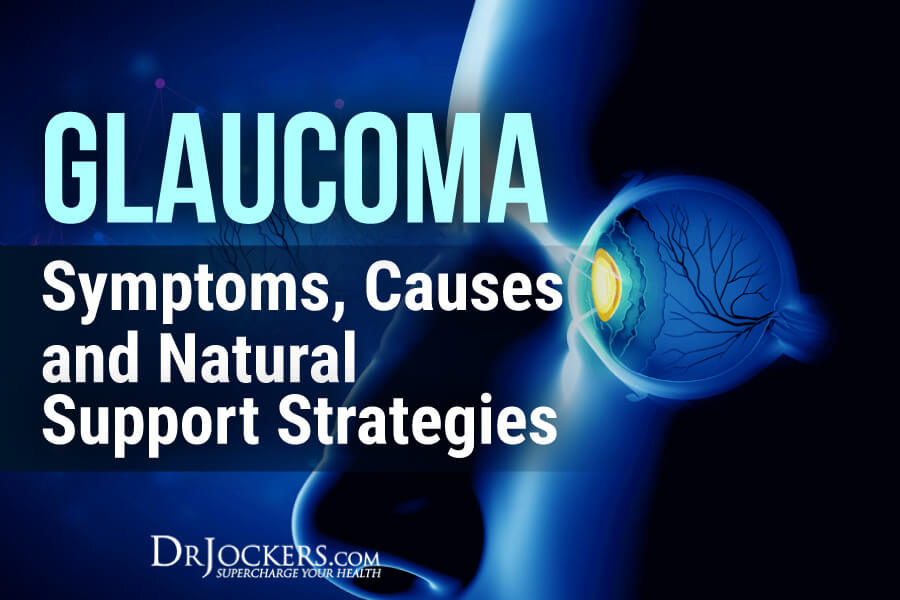 Glaucoma: Symptoms, Causes and Natural Support Strategies
Glaucoma: Symptoms, Causes and Natural Support Strategies
Glaucoma is an eye condition that damages your optic nerve and may lead to vision loss and blindness. Early diagnosis and prevention are key to protect your eye health and reduce your risk of serious optic nerve damage and blindness. Natural dietary and lifestyle support strategies and supplementation may help you to protect your eye health.
In this article, you will learn what glaucoma is. You will understand the types, symptoms, and main causes of glaucoma. I will also share my natural support strategies for eye health.

What Is Glaucoma
Glaucoma is an eye disease that affects and damages your eye’s optic nerve. Your optic nerve is a very important part of your vision as it supplies visual information from your eyes to your brain. Glaucoma usually happens because of extra fluid increases that create abnormally high pressure on your eye.
This increased pressure gradually damages your optic nerve tissue. This is a very serious problem that can lead to vision loss or blindness. In fact, it is the leading cause of blindness in people over 60. Preventing and catching glaucoma early is critical for preventing further vision loss (1).
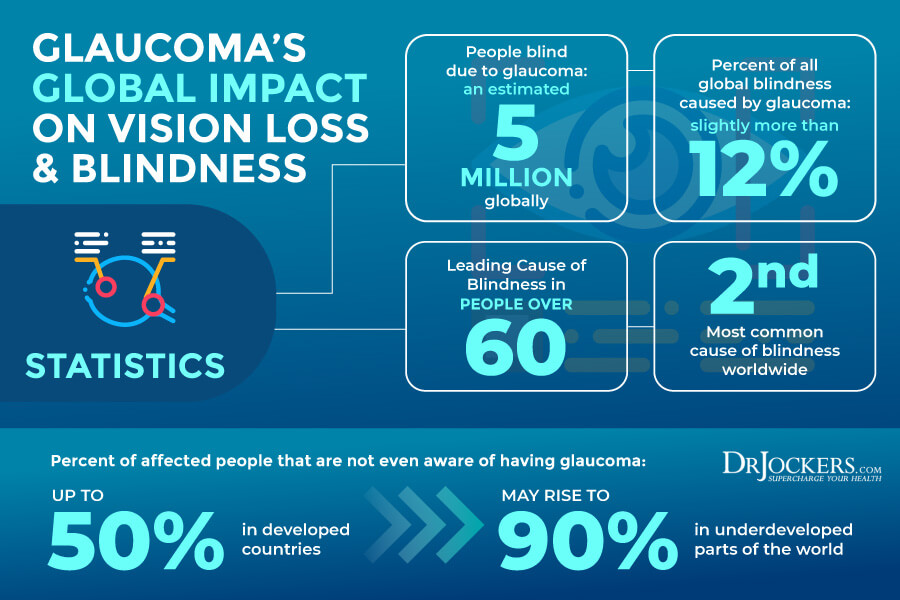
Types of Glaucoma
There are two main types of glaucoma that you need to be aware of:
Primary Open-Angle Glaucoma
Primary open-angle glaucoma is the most common form of glaucoma. It develops gradually if your eyes are unable to drain fluid properly. This can lead to clogged drains, increased eye pressure, and damage to the optic nerve. It is a painless process that at first doesn’t cause any vision changes.
Those with optic nerve sensitivity to normal eye pressure may have a higher risk of developing this condition as well as macular degeneration. Regular eye exams are critical for early diagnosis and preventing further damage. Since in the early stages, this condition is symptom-free, eye exams are your only option for early diagnosis (1).
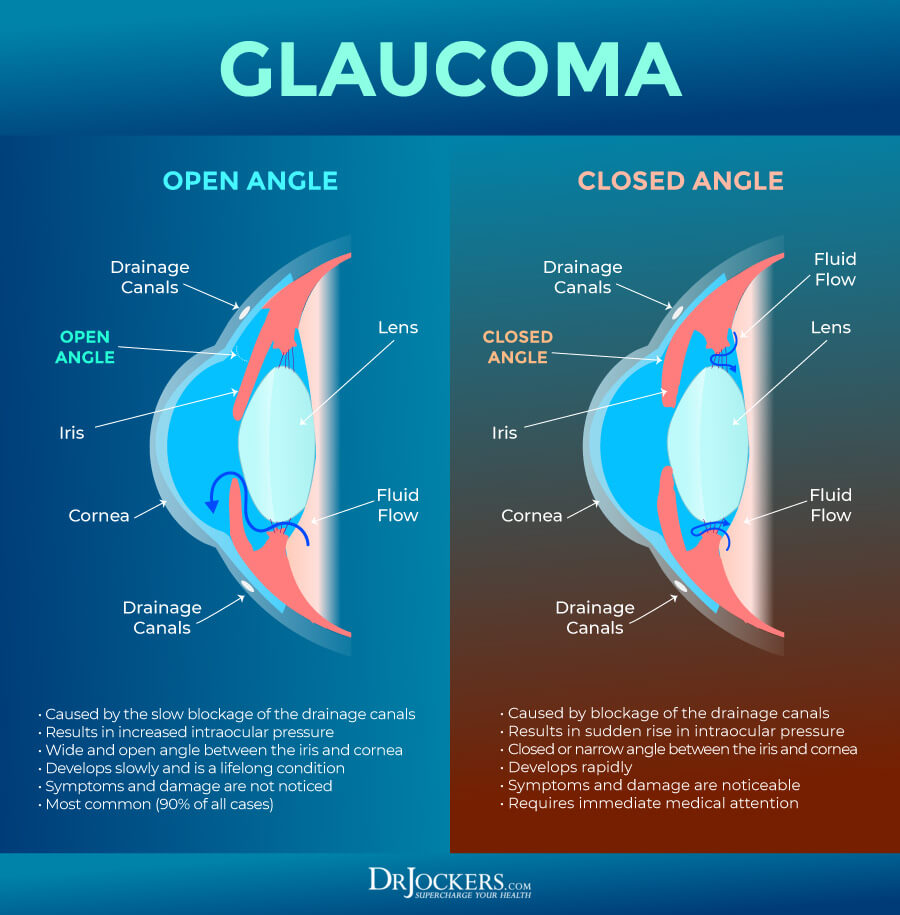
Angle-Closure Glaucoma
Angle-closure glaucoma, or closed-angle glaucoma, or narrow-angle glaucoma may develop if your iris is too close to the drainage angle in your eyes and blocks it from proper drainage. Imagine your drains in your sink. Now imagine a piece of paper sliding in and blocking the water from draining. This is how this condition works. Once this drainage gets fully congested, eye pressure can increase very rapidly leading to an acute attack (1).
An acute glaucoma attack is characterized by sudden blurry vision, eye pain, headache, nausea, vomiting, and rainbow-colored rings or halos around lights. Such an attack is a real emergency. If this happens to you or a loved one, call your ophthalmologist right away to prevent blindness (1).
While such an attack is sudden and serious, the condition is usually not. Most people with angle-closure glaucoma develop a chronic form gradually with no symptoms. They won’t know it that they have it until a sudden and severe attack. Visiting your eye doctor regularly is critical for prevention and treatment. Proper treatment right away is critical to prevent blindness (1).
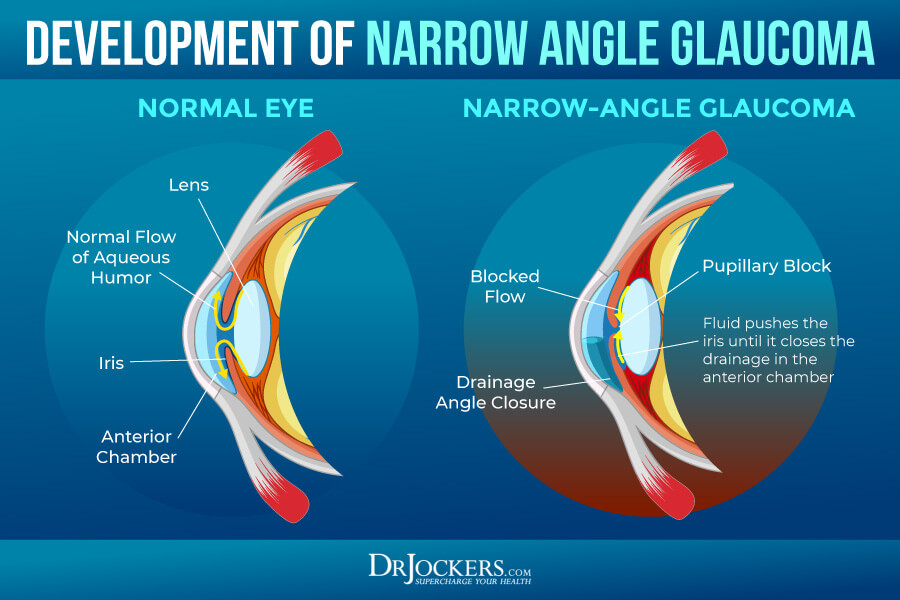
Main Symptoms of Glaucoma
Primary open-angle glaucoma doesn’t have any symptoms at onset and usually, gradual vision loss is the only sign of the condition. Regular yearly comprehensive eye exams with your eye specialists are critical to monitor your eye health, notice any changes, and identify early signs of glaucoma (1).
Acute angle-closure glaucoma can also develop gradually making regular eye exams essential. The first symptom is usually a sudden attack which is a medical emergency that requires medical attention right away. Symptoms of such an attack may include (1):
- Sudden blurry vision
- Severe eye pain
- Redness in your eyes
- Sudden vision disturbance
- Headache
- Nausea
- Vomiting
- Rainbow-colored rings or halos around lights
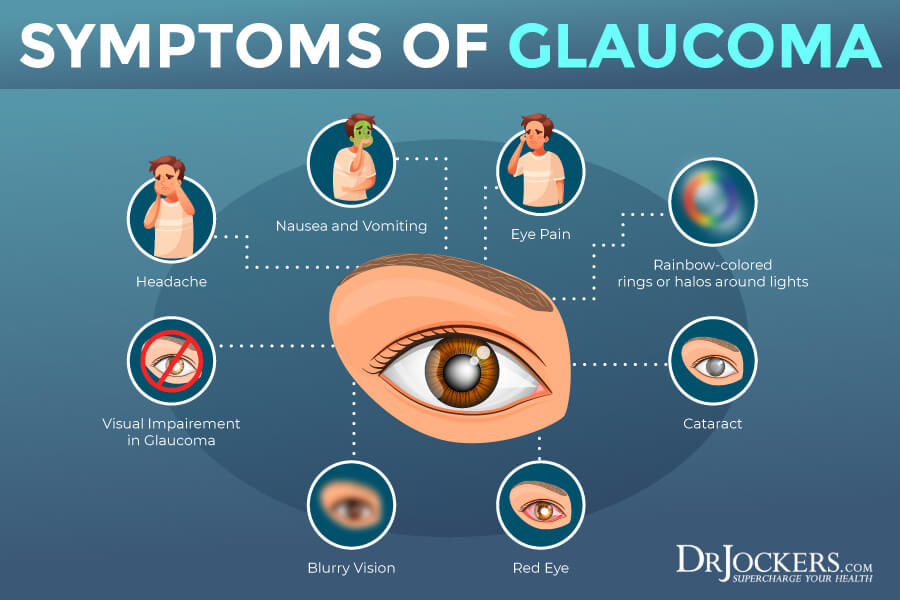
Main Causes of Glaucoma
Glaucoma blocks a clear fluid called aqueous humor from draining. This fluid is created at the back of your eyes, fills up the front portion of your eyes, then leaves through channels of your cornea and iris. When these channels get blocked, intraocular pressure (IOP) will increase and may damage your optic nerve. Damage to the optic nerve may cause glaucoma that may lead to vision loss and blindness.
While it is not fully understood what causes this increased pressure, there are a variety of health and lifestyle factors that may lead to a role in the development of glaucoma. Let’s look at the main causes of glaucoma.
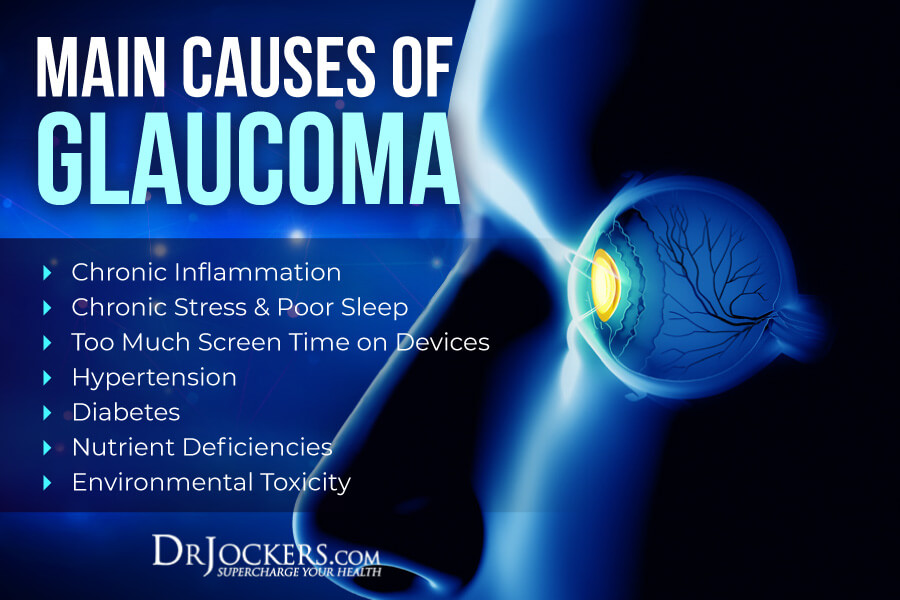
Chronic Inflammation
Chronic inflammation doesn’t just happen in one area of your body. It can affect all areas of your body and can lead to specific inflammation and inflammation-related health conditions, affecting various areas of your body, including your eye health. According to a 2014 study published in the Cold Spring Harbor Perspectives in Medicine, neuroinflammation or inflammatory processes in the central nervous system can contribute to the development of human glaucoma (2).
Understanding neuroinflammation in the central nervous system is essential for understanding and preventing glaucoma, especially during the early stages of this optic nerve damage. According to a 2011 study published in the Omal Journal of Ophthalmology, about 20 percent of glaucoma patients have acute, subacute, or chronic anterior uveitis leading to inflammatory of uveitic glaucoma and anti-inflammatory agents may play an important role in treatment (3).
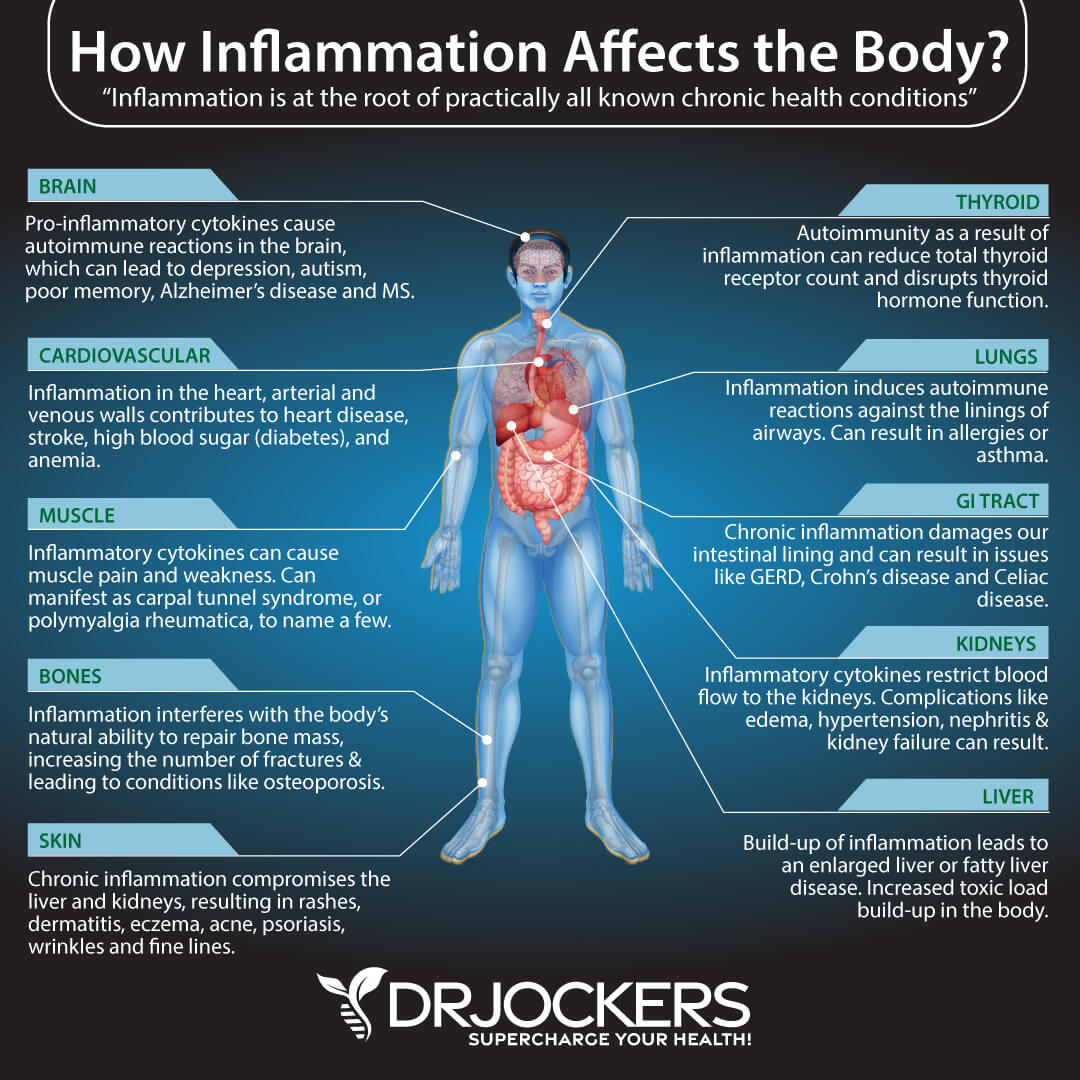
Chronic Stress & Poor Sleep
Chronic stress and poor sleep are both poor lifestyle choices that may increase your risk of chronic inflammation and eye damage. A 1987 study published in the American Journal of Physiological Ophthalmology has found that psychophysiological stress may increase intraocular pressure and lead to acute closed-angle glaucoma (4).
A 2019 study published in BMC Ophthalmology backed these findings by discovering that acute emotional stress may trigger intraocular pressure increase contributing to glaucoma (5). Poor sleep and sleep issues can increase your inflammation levels and lead to consequent health issues. A 2000 study published in Ophthalmologica has found an association between sleep-related conditions, such as sleep apnea and primary open-angle glaucoma (6).
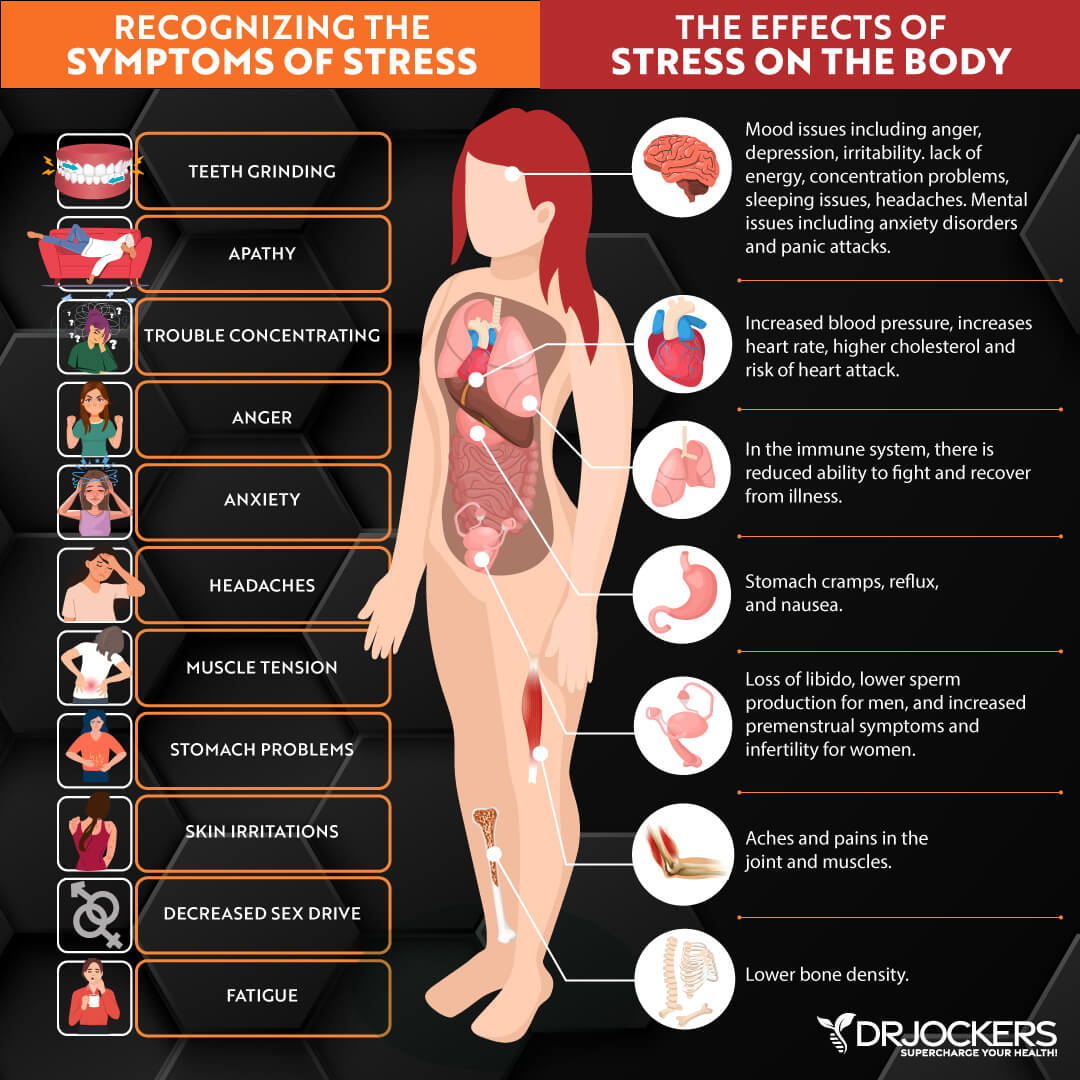
Too Much Screen Time on Devices
Spending too much time on various devices, such as your phone, tablets, and computers can have serious health consequences. It can be particularly straining for your eye. It may lead to blurry vision, fatigued eyes, headaches, and eye strain.
The American Association of Ophthalmology and The Glaucoma Foundation both warn you that too much screen time may contribute to the development of glaucoma and other eye issues such as cataracts (7, 8). A 2004 cross-sectional study on 10 202 randomly selected Japanese workers published in the Journal of Epidemiology and Community Health has found a potential connection between technology use and glaucoma and other eye health issues, such as nearsightedness (9).
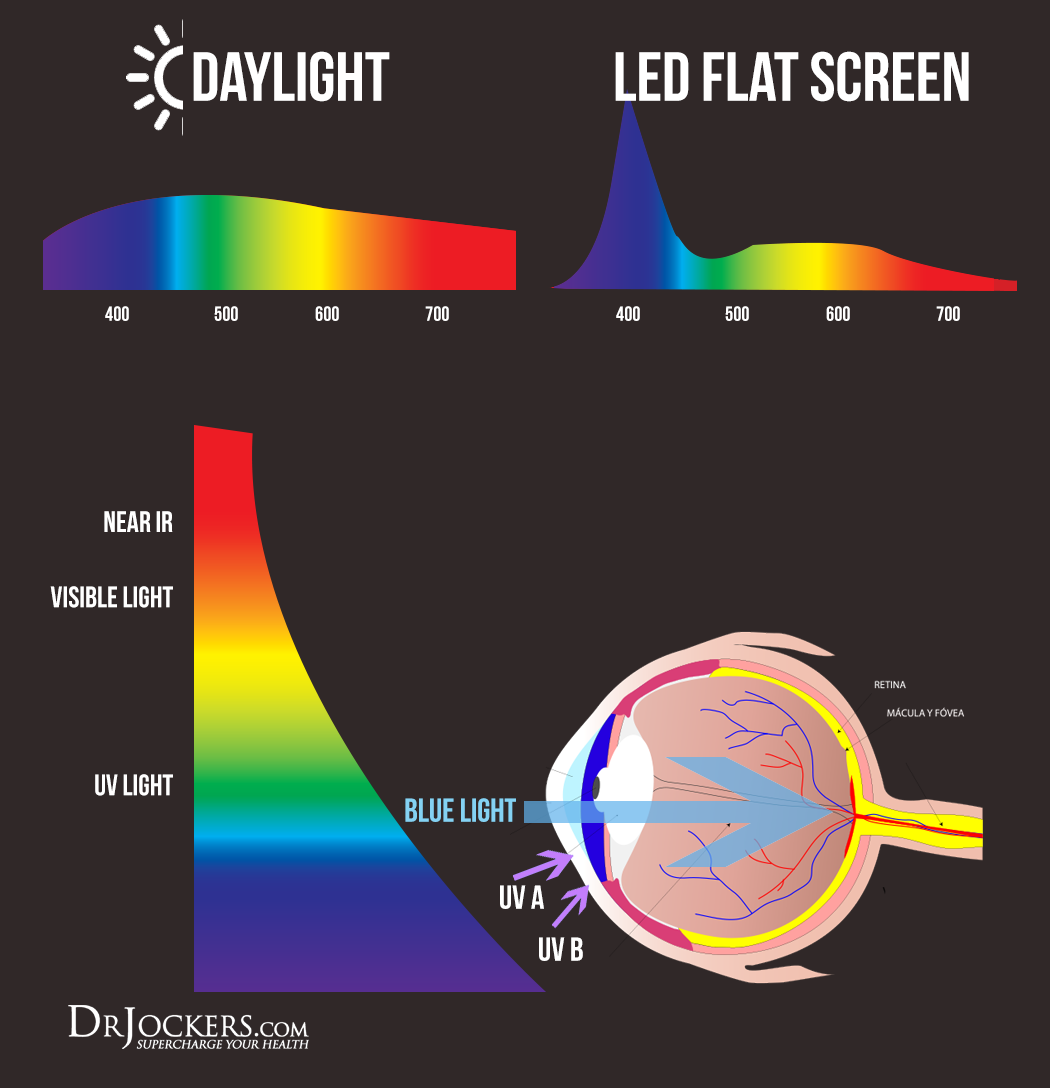
Hypertension
Hypertension or high blood pressure is a common yet dangerous health condition that can lead to serious health issues, including heart disease, heart attacks, stroke, and even death. Hypertension may also contribute to glaucoma. According to the Glaucoma Research Foundation, blood pressure changes may be one of the non-traditional factors in glaucoma (10).
Normally, our bodies are able to adapt to changes in blood pressure, but in some individuals, it is more difficult to adjust to circulation changes. According to a 2004 evidence-based assessment published in the American Journal of Ophthalmology, ocular hypertension may be a risk factor for the development of glaucoma and should be considered during treatment (11).
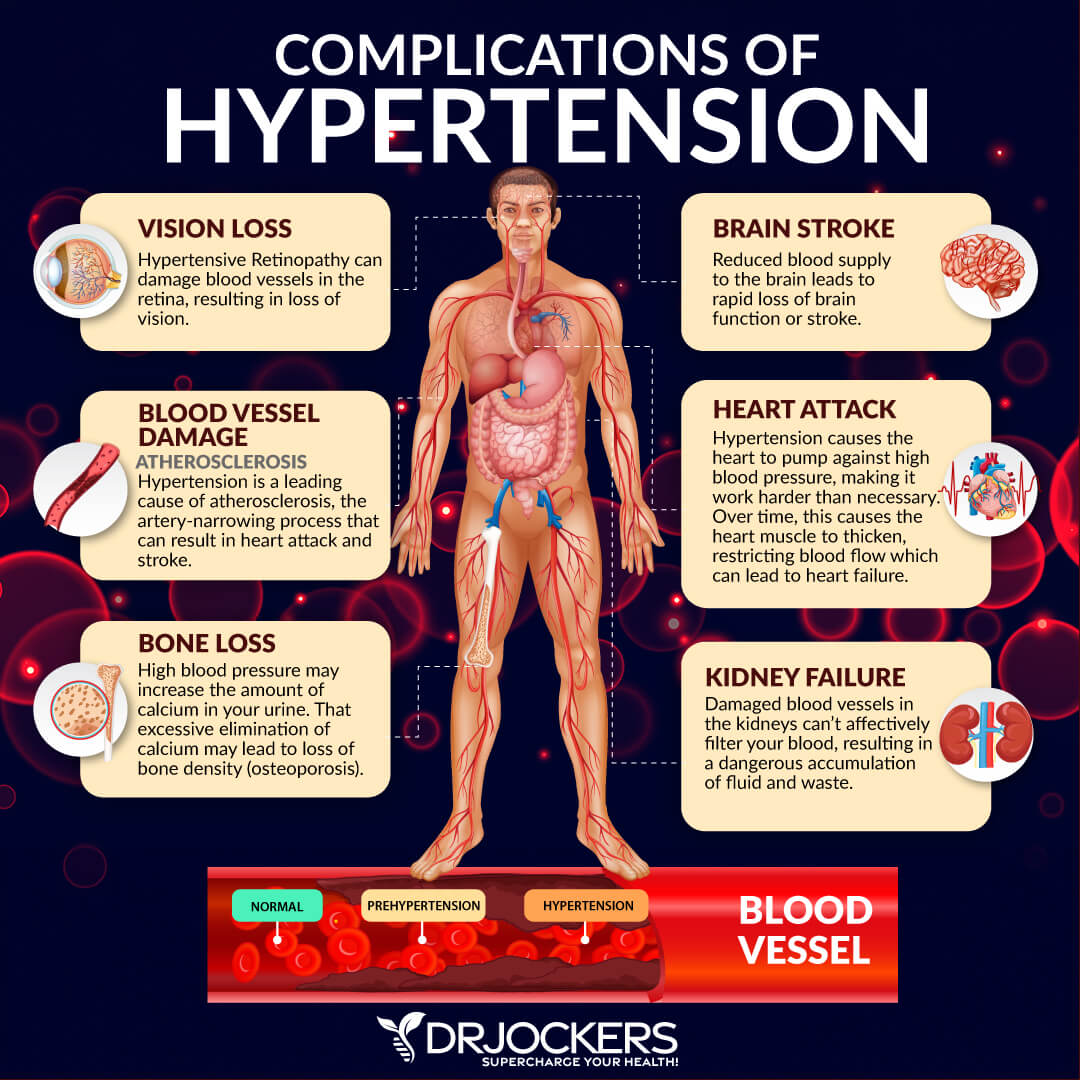
Diabetes
Diabetes is a metabolic disease in which your blood sugar (blood glucose) levels are too high. In type 1 diabetes, your body is unable to make insulin and unable to deal with your blood sugar. In type 2 diabetes, your body is unable to make enough insulin to take care of your blood sugar levels.
Without insulin or enough insulin, glucose stays in your body and can lead to serious health consequences. According to a 2017 systematic review and meta-analysis published in the International Journal of Ophthalmology, diabetes may increase the risk of glaucoma by 36 percent (12).
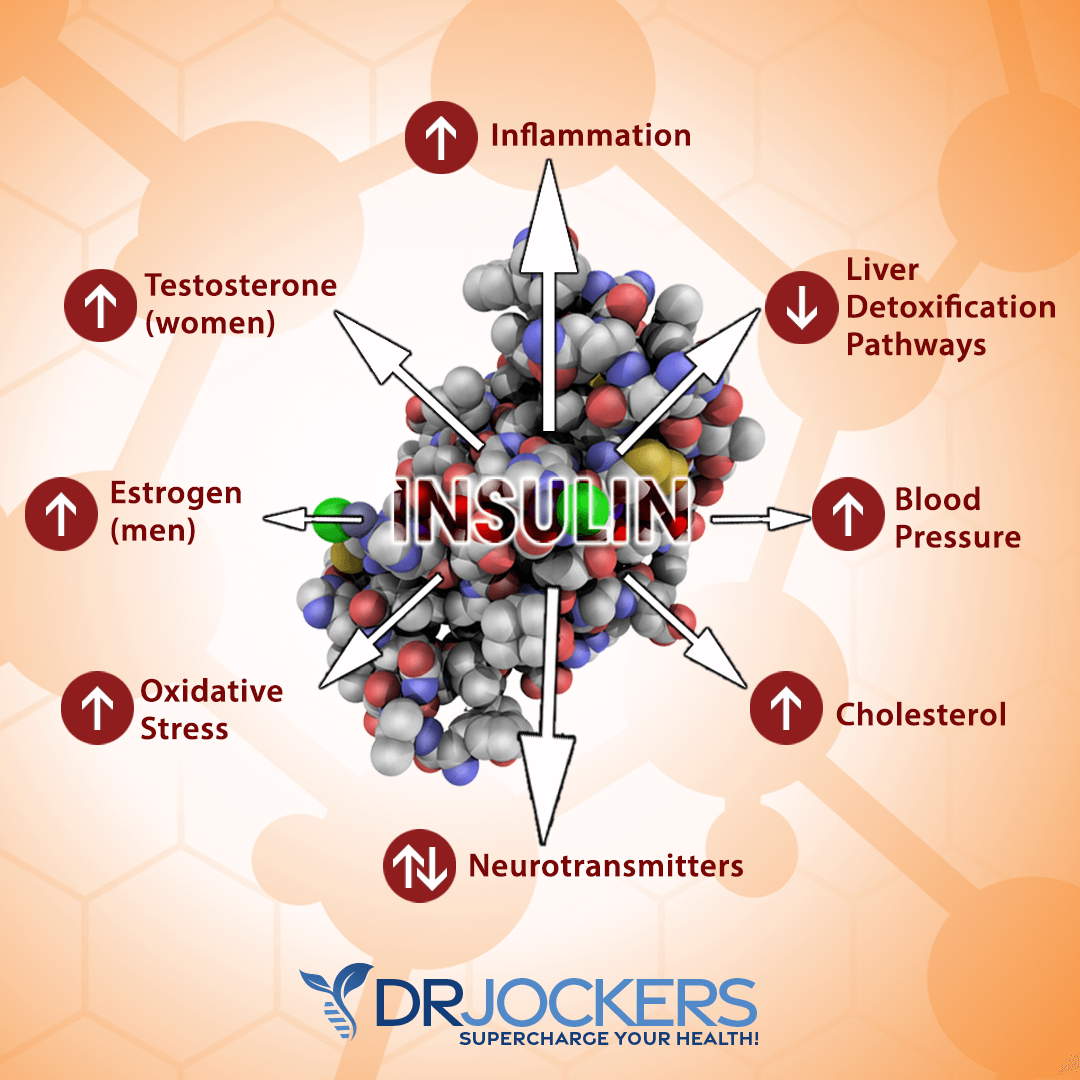
Nutrient Deficiencies
Nutrient deficiencies are one of the main factors behind glaucoma and some of its risk factors. There are several nutrients that have specifically been linked to eye damage and glaucoma.
Vitamin A & C
Vitamin A and C are both very important vitamins that are essential for your immune system and overall health. According to a 2018 systematic review and meta-analysis of 629 scientific articles published in Nutrients, vitamin A and C are both beneficial for glaucoma (13).
Vitamin D
Vitamin D is important for bone and muscle health, immune function, and other health factors. According to a 2016 retrospective, cross-sectional study on 169,208 subjects older than 20 years 123,331 subjects older than 20 years published in the Korean Journal of Ophthalmology, low levels of vitamin D were significantly associated with an elevated risk of glaucoma in females compares to those with higher levels of vitamin D (14).
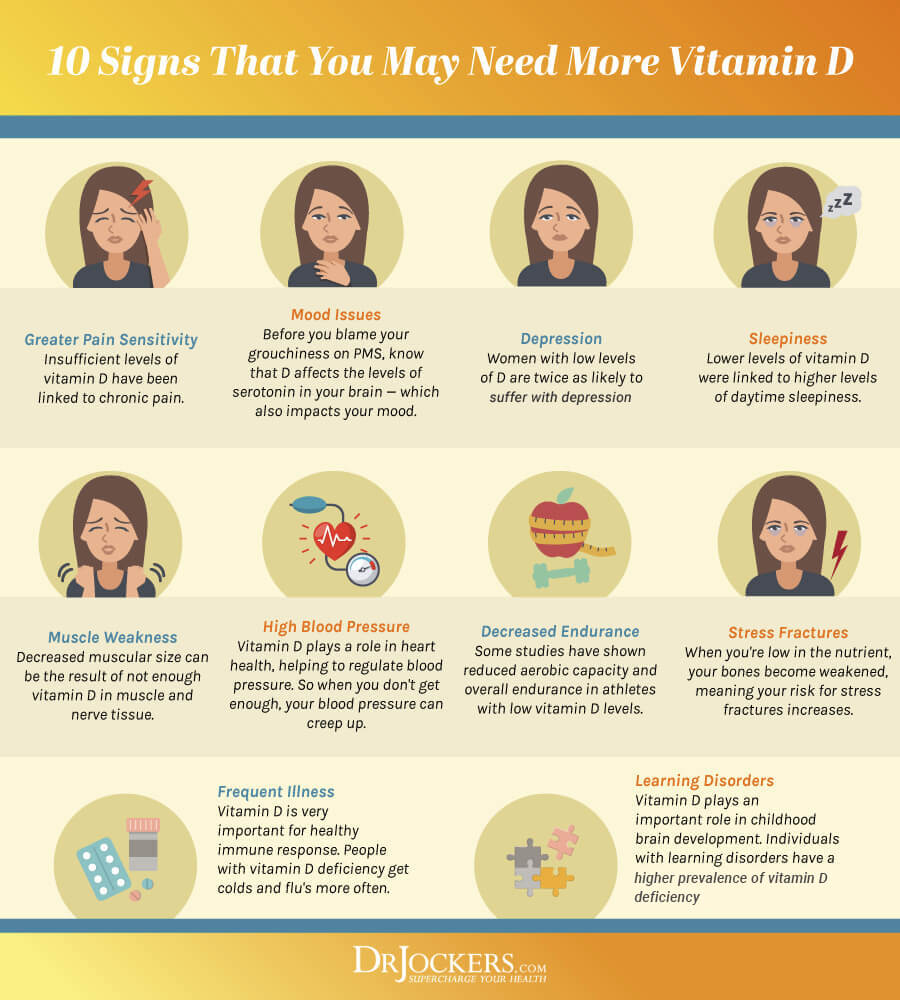
Folate
B vitamins are essential for your heart, brain, mental, and other areas of your health. Folate specifically is incredibly beneficial for your eye health. Folate is a common deficiency due to poor nutritional intake and the common MTHFR gene mutation that causes one to need an increased intake of folate.
A 2014 prospective study published in the Journal of American Medical Association Ophthalmology found an association between folate levels and the risk of developing glaucoma, while it did not find an association between vitamin B6 and B12 and glaucoma (15).
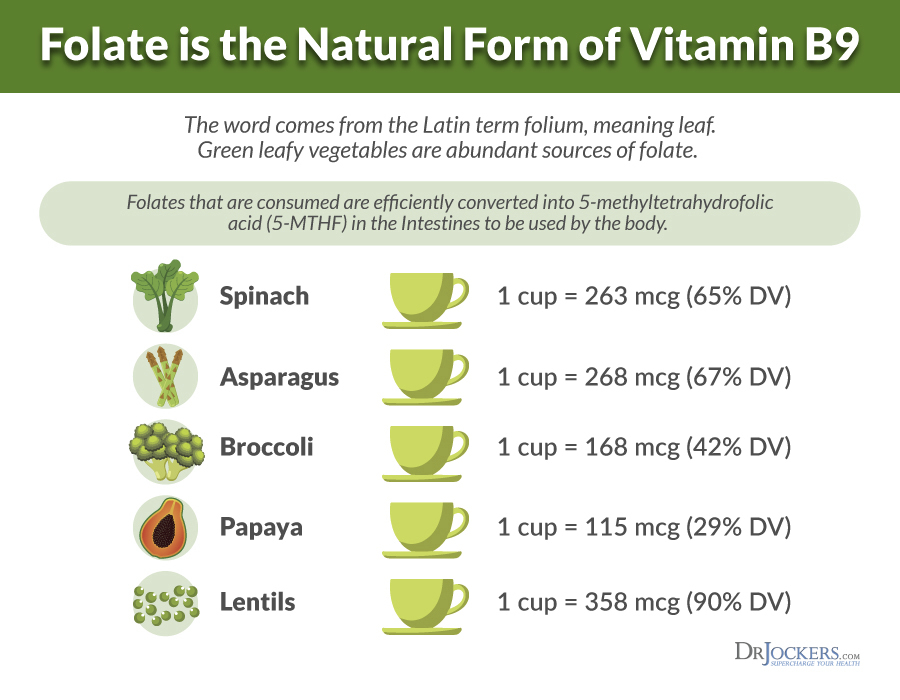
Omega 3
Omega 3-fatty acids have anti-inflammatory properties that help to lower inflammation and keep your body thriving. They play a very important role in the cell membrane of every cell in our body.
Omega 3 fatty acids are particularly important for brain, nervous system and eye health. According to a 2007 study published in Investigative Ophthalmology & Visual Science, optimal omega-3 levels may lower intraocular pressure with age and lower the risk of the development of glaucoma (16).
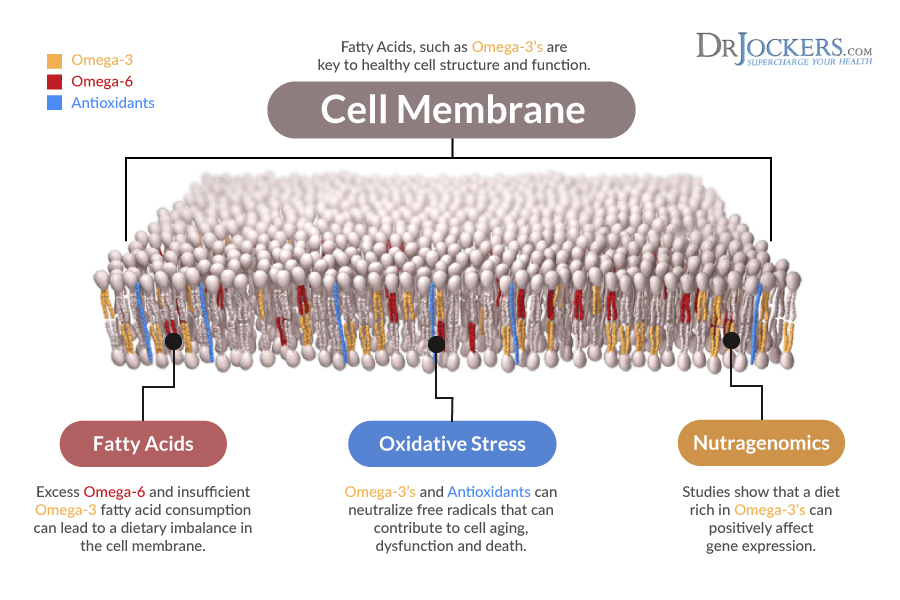
Glutathione
Glutathione is an antioxidant found in plants, animals, fungi, and some bacteria and archaea that may help to reduce oxidative stress and certain health risk. According to a 1992 study published in Vestnik Oftalmologii on 151 patients with open-angle glaucoma, 23 ones with closed-angle glaucoma, and 57 ones with age-associated cataracts, glutathione deficiency may increase the risk of open-angle glaucoma (17).
Environmental Toxicity
Your liver is an important organ that is responsible for detoxification. According to Traditional Chinese Medicine (TCM), a medical system that looks at the body differently than traditional doctors using thousands of years of practice, your liver stores blood, hence liver toxicity may result in the malnutrition of eyes and eye health issues, including glaucoma (18).
A 2016 study published in PLoS One, nonalcoholic fatty liver disease, which is prevalent in diabetes, may be connected to retinopathy and eye health issues, such as glaucoma (19).
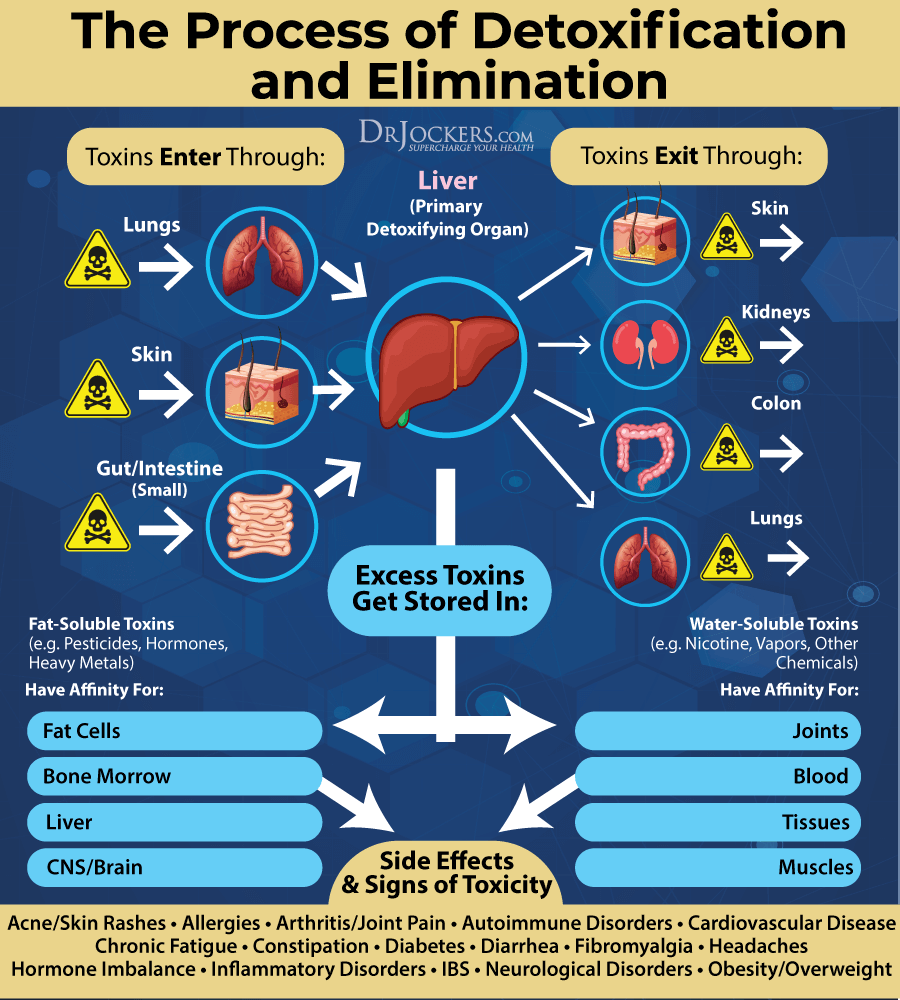
Natural Strategies for Glaucoma
Prevention and early detection is absolutely critical for glaucoma and reducing the risk of vision loss and blindness. The good news is that there are a variety of natural strategies you can try for glaucoma and eye health. Here is what I recommend:
Anti-Inflammatory Diet & Lifestyle
Eating an anti-inflammatory, nutrient-dense diet is crucial when it comes to glaucoma (2, 3). Eliminate all inflammatory foods, including refined sugar and grains, gluten, refined oils, deep-fried and processed foods, grain-fed meat and eggs, conventional dairy, soda and sugary drinks, and foods that you are sensitive to. Instead, follow an anti-inflammatory, whole foods plan with lots of greens, veggies, low glycemic index foods, herbs, spices, healthy fats, fermented foods, grass-fed meat, pastured raised poultry, wild-caught fish, and wild game.
In addition to a nutrient-dense anti-inflammatory diet, focus on healthy lifestyle strategies that help to lower inflammation. Stress reduction, good sleep, increased movement, and time outdoors are all critical. Read this article learn more about some anti-inflammatory lifestyle strategies I recommend.
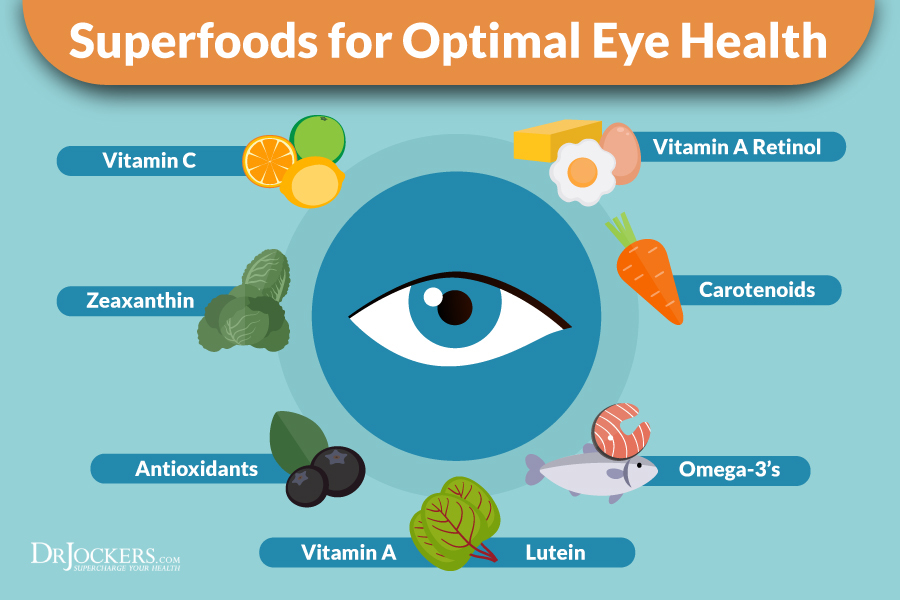
Regular Movement & Exercise
Regular movement and exercise are a crucial part of a healthy, anti-inflammatory lifestyle. They help to lower chronic stress and chronic inflammation and promote sleep, all of which are factors to glaucoma (2, 3, 4, 5, 6). Move regularly throughout the day by choosing to take the stairs, biking or walking instead of driving short distances, taking a walk at lunch, stretching regularly, gardening, playing with your kids, walking your dog, and dancing to your favorite song.
Exercise at least 20 to 30 minutes minimally 5 times a week. Try a combination of cardiovascular exercise, strength and resistance training, and low-impact exercise. High-intensity interval training (HIIT) is a great workout that combines cardio, resistance training, and strength work. If you are not used to exercising regularly, try a variety of workouts until you find a combination that you love and works for you.
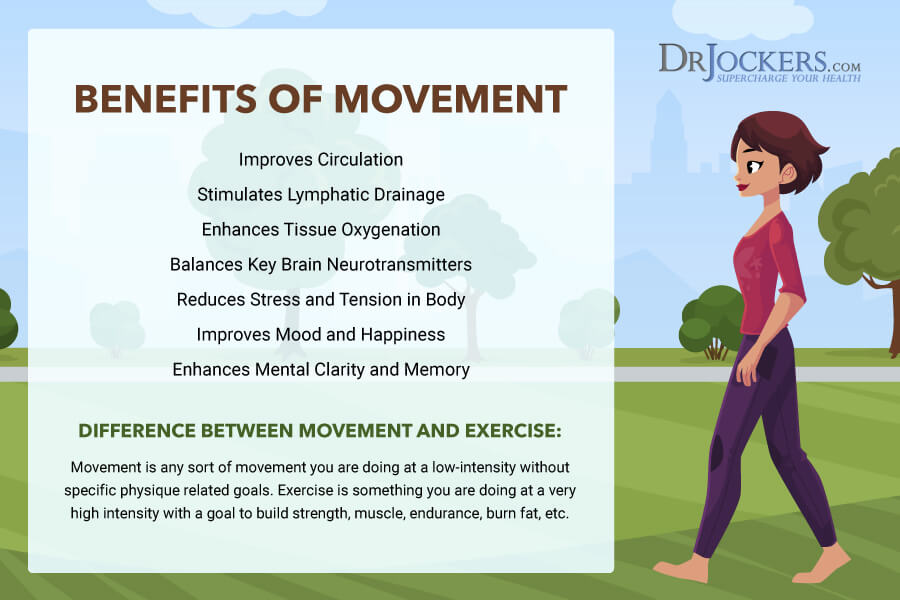
Reduce Stress & Optimize Sleep
Reducing your stress levels is critical for your eye health (4, 5, 6). I recommend that you try practicing meditation, breathwork, positive affirmations, positive self-talk, mindset shifts, gratitude, prayer, journaling, yoga, and relaxation recordings to reduce stress. Go for nature walks, exercise regularly, take relaxing baths, and sip on herbal tea. Spend time with people that support you and lift up your spirit.
Poor sleep is another contributing factor to inflammation, eye issues, and glaucoma. Good-quality sleep is essential for rest and repair. Go to bed and wake up around the same time to support your natural sleep patterns.
Develop a relaxing nighttime routine that works for you. Turn off electronics and avoid sugar or caffeine close to bedtime. Engage in relaxing activities, such as meditation, journaling, reading, stretching, coloring, and board games. Practice gratitude as you are turning off the lights.

Limit Screen Time & Optimize Time Outdoors
Blue light exposure and too much screen time are straining on your eyes but may contribute to glaucoma and long-term eye damage (7, 8, 9). Limit your screen time as much as possible. Turn off your phone, tablet, and laptop unless you need it. Use apps that block social media for a certain period to avoid getting sucked in.
Avoid all electronics at least two hours before bedtime. Instead of technology, spend more time outdoors. Go for a walk in the park. Try gardening. Go for a hike and discover a new county, state, or national park. Go for a run or a bike ride. If you live in a colder climate, maximize winter by playing in the snow or going snowshoeing or cross-country skiing.
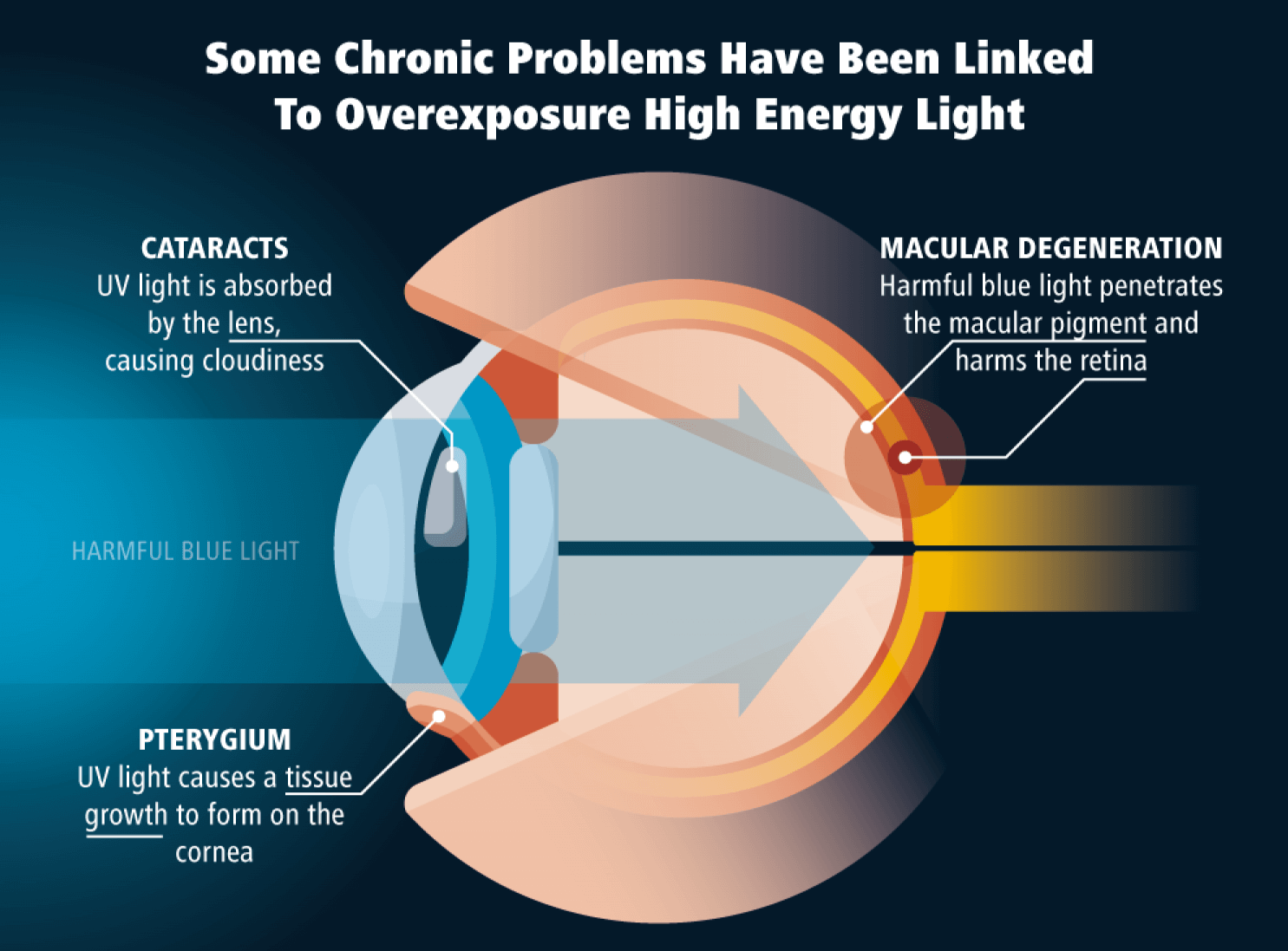
Eye Protection
While limiting technology is critical for your eye health, it is impossible to completely avoid technology (7, 8, 9). You are reading this article on your phone, tablet, laptop, or computer after all. When you are using technology, use blue light blocking glasses, especially when you are using technology for long periods or it’s the evening.
Besides technology, UV lights from the sun can be damaging as well. I recommend that you wear anti-glare sunglasses outside during times of peak UV intensity. Remember, the sun may be out and strong during the winter and on cold days making anti-glare sunglasses necessary year-round no matter where you live.
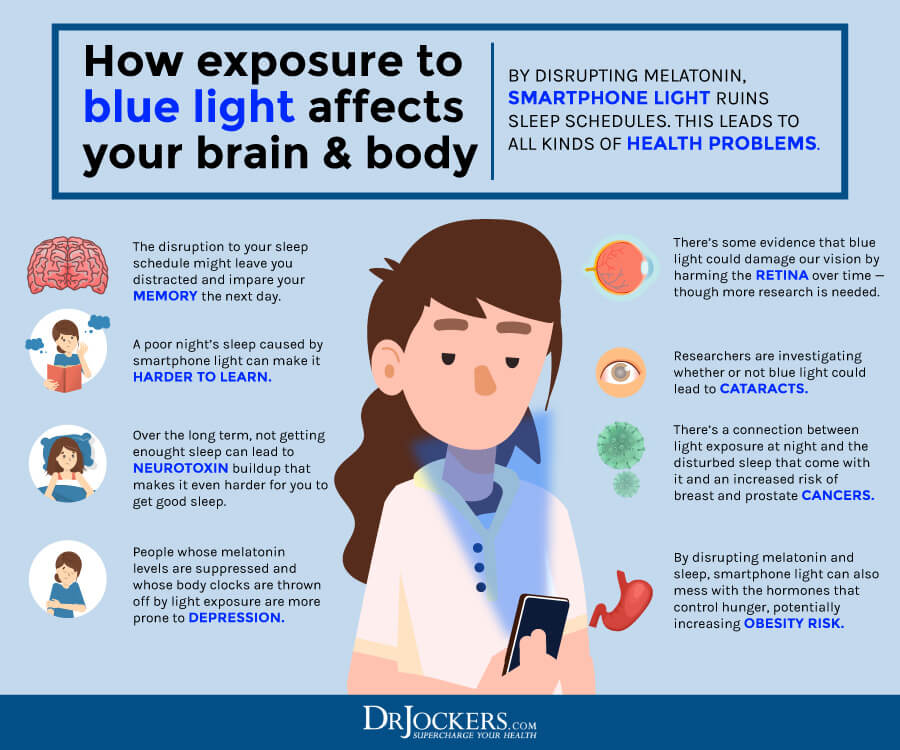
Optimize Vitamin D Levels
Vitamin D is essential for your overall health and the American Optometric Association recommends vitamin D for eye health (20). According to a 2020 study published in the British Journal of Ophthalmology, low vitamin D levels may pose a potential risk for primary open-angle glaucoma (21). One of the best ways to improve your vitamin D levels is by spending time in the sun.
The problem is that we spend so much of our time indoors and many of us face colder and gloomier weather for much of the year. This makes it impossible to meet all your vitamin D needs from the sun alone. Eating food high in vitamin D, such as fatty fish, beef liver, and eggs, is also beneficial, but not enough. To optimize your vitamin D levels, I recommend getting a good amount of daily sun exposure and also consider supplementating with 5,000 to 10,000 IU daily in order to get your levels up over 50 ng/ml.
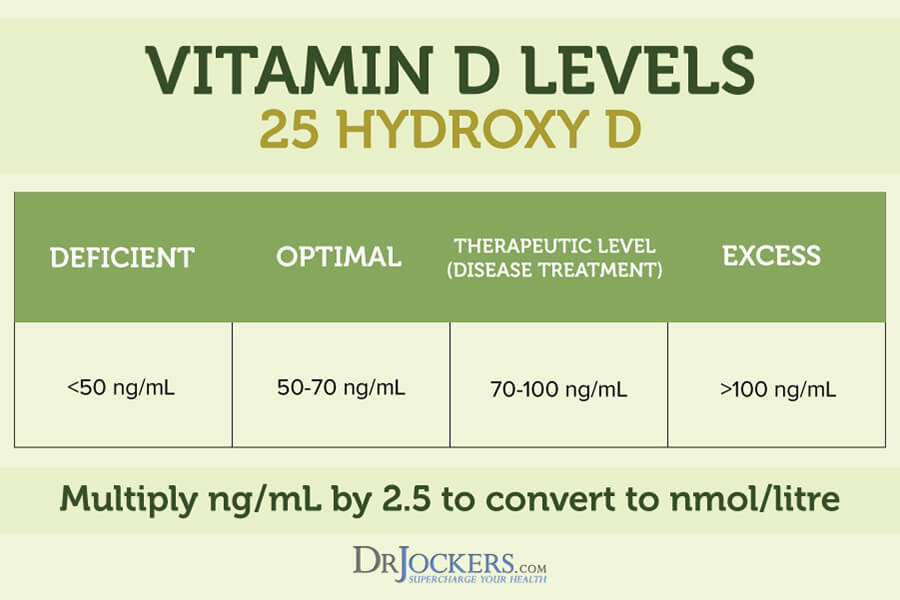
Use Cod Liver Oil
Improving your omega-3 levels is critical for your eye health and may help to lower your risk of glaucoma (16). Cod Liver oil is one of the world’s best sources of the omega 3 fatty acids EPA and DHA.
Additionally to omega-3, cod liver oil is also rich in vitamin A, another beneficial nutrient for glaucoma. A 2011 study published in the International Journal of Ophthalmology has found that cod liver oil may be beneficial and protective for glaucoma (22). For eye health, I recommend a daily dose of cod liver oil supplementation.
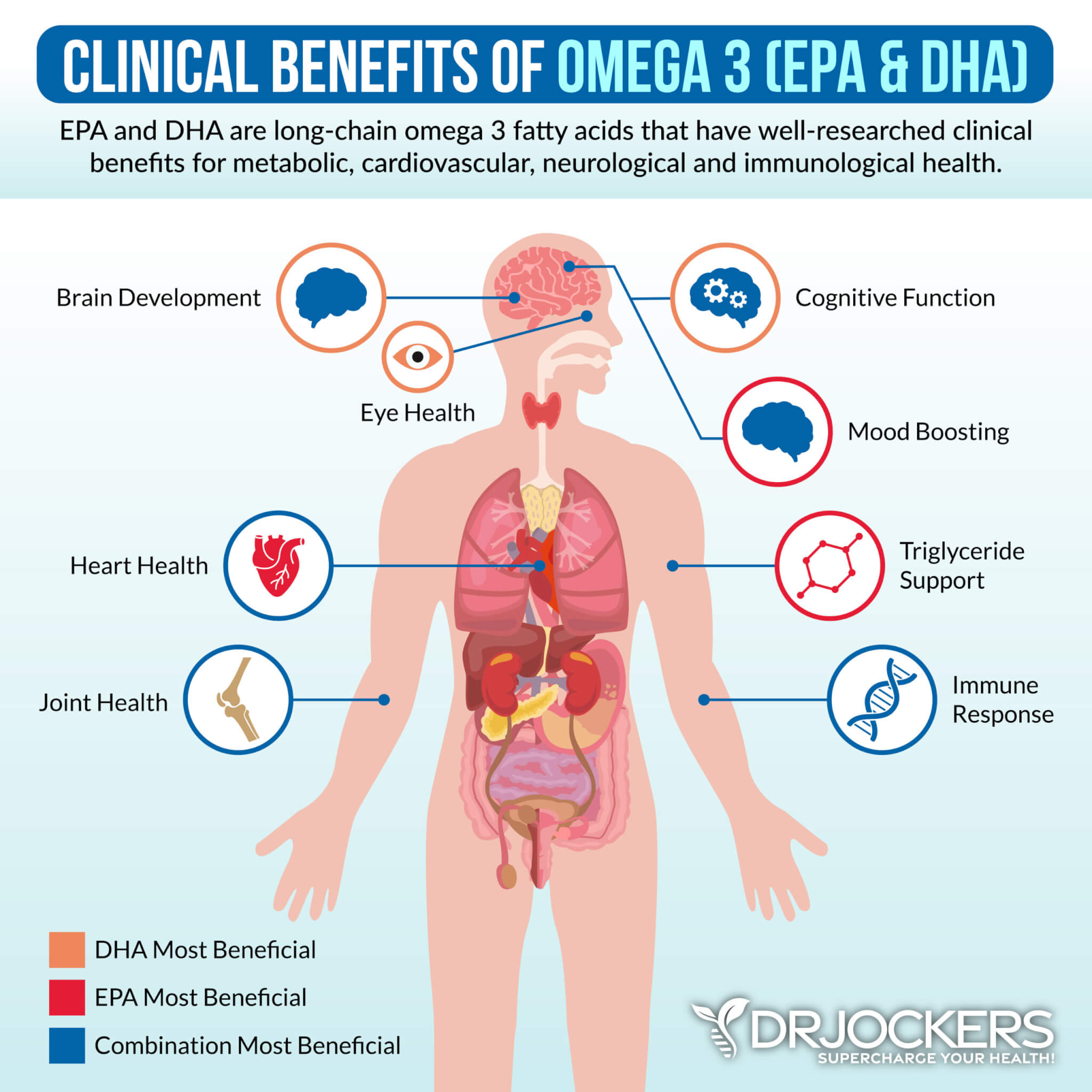
Optimize Lutein, Zeaxanthin & Glutathione Levels
Glutathione is a powerful antioxidant with eye-supporting benefits (17). Zeaxanthin and lutein are two other nutrients that may also offer eye support.
According to a 2016 study published in the Annual Review of Nutrition, lutein and zeaxanthin may both have eye-protective benefits (23). I recommend daily supplementation with lutein, zeaxanthin, and glutathione for eye health.

Consider High Dose Resveratrol & Quercetin
Resveratrol is a polyphenol found in the skin of grapes, blueberries, raspberries, mulberries, and peanuts. Quercetin is a flavonol found in many fruits, vegetables, leaves, seeds, and grains. They both have eye-protective health benefits. According to a 2009 study published in Food Chemistry and Toxicology, resveratrol may help to reduce the expression of glaucoma markers (24).
A 2019 study published in Frontiers in Molecular Neurosciences agrees that resveratrol may have beneficial anti-inflammatory benefits for glaucoma (25). According to a 2017 study published in Frontiers in Molecular Neuroscience, looking at in vivo rat models and in vitro cell cultures, quercetin may have benefits for retinal health and glaucoma (26). I recommend daily supplementation with resveratrol and quercetin for eye health.
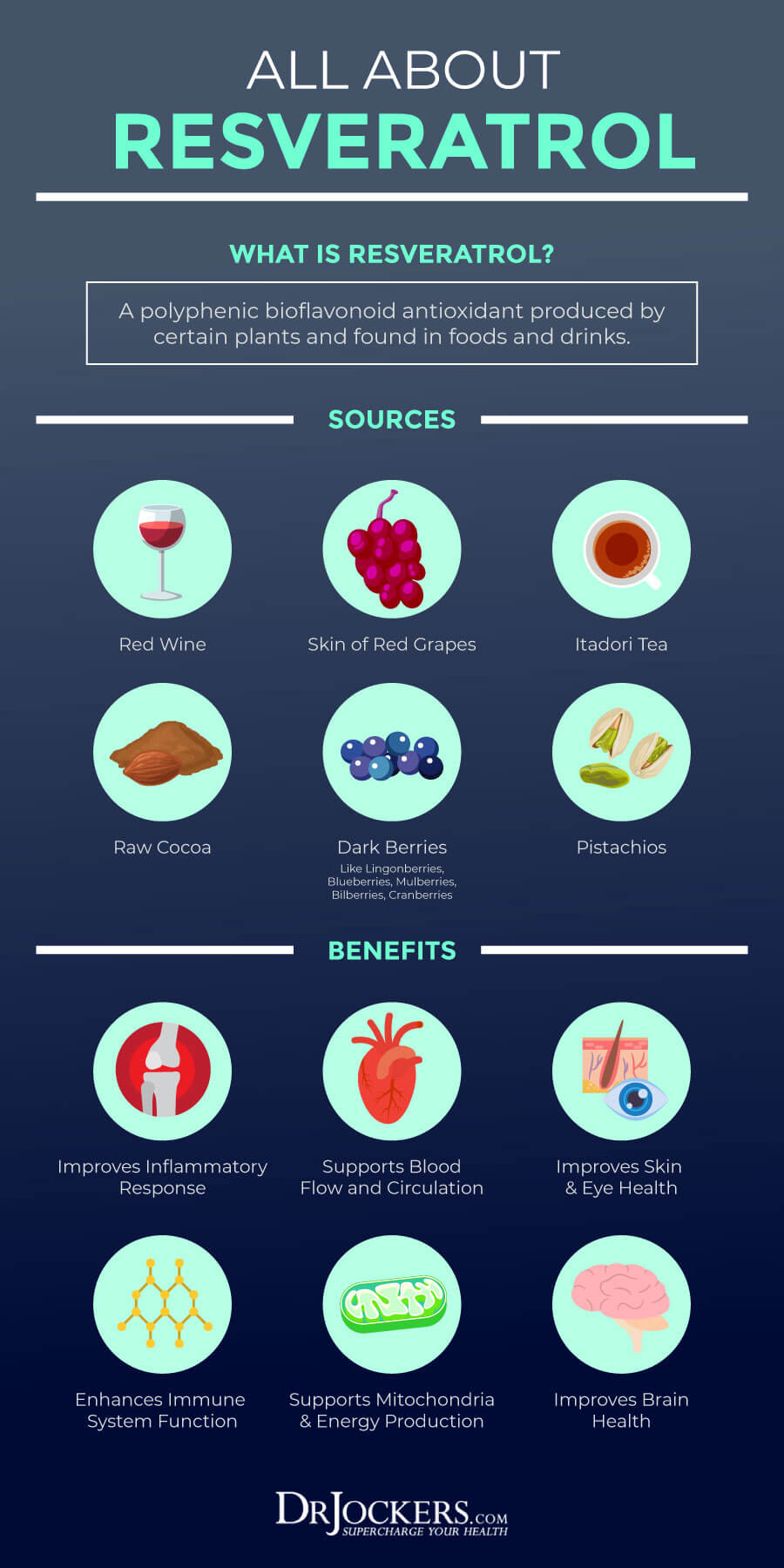
Final Thoughts
Glaucoma is an increasingly prevalent eye condition that may lead to vision loss and blindness. It is caused by a variety of factors, including chronic inflammation, poor diet and lifestyle, poor sleep, and nutrient deficiencies.
However, there are several simple dietary and lifestyle changes you can make to reduce your risk of glaucoma and further damage to your eyes. Following my steps as outlined in this article will help to improve your overall eye health.
If you want to work with a functional health coach, I recommend this article with tips on how to find a great coach. On our website, we offer long-distance functional health coaching programs to help you achieve your health goals.
Inflammation Crushing Ebundle
The Inflammation Crushing Ebundle is designed to help you improve your brain, liver, immune system and discover the healing strategies, foods and recipes to burn fat, reduce inflammation and Thrive in Life!
As a doctor of natural medicine, I have spent the past 20 years studying the best healing strategies and worked with hundreds of coaching clients, helping them overcome chronic health conditions and optimize their overall health.
In our Inflammation Crushing Ebundle, I have put together my very best strategies to reduce inflammation and optimize your healing potential. Take a look at what you will get inside these valuable guides below!




Thank you so much for sharing your research, knowledge and experience, helping so many people educate themselves to stay healthy. I always learn something new when I read your newsletter and take steps to improve. 🌈✨💞
Great to hear this and thank you for your support! Be Blessed!
Hello Dr Jockers
I have early onset of glaucoma. Please advise what is the best source of glutathione or any supplements containing it.
Thank you. God bless always.
Hello Betty, sorry to hear this! We have an article that goes over this in detail here: https://drjockers.com/glutathione-levels/
You should add than severe myopia is a factor to developing glaucoma. This is my case. Unfortunately, nobody told me the importance of this and I loss a part of my left eye sight. My pressure is not well controled and the follow-up with the ophtalmologist has not been what it should have been with the pandemia, so I am losing peripheric sight now. I am only 61. Please, advise people with severe myopia to get checked more often.
Yes thanks for sharing!